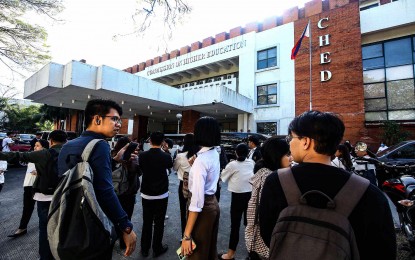
HOAX. Employees of the Commission on Higher Education in Diliman, Quezon City rush out of their buildings due to a bomb threat on Monday (Feb. 12, 2024). Several government agencies received similar threats but none were verified as real. (PNA photo by Joan Bondoc)
MANILA – The series of bomb scares that disrupted the operations of various government offices and public schools on Monday were connected to previous instances of hoax threats made by an alleged Japanese national during the last quarter of 2023, based on the initial investigation by the police’s Anti-Cybercrime Group.
The Philippine National Police (PNP) thus advised the public to remain vigilant and avoid sharing unverified information as it may lead to unnecessary panic and confusion.
“Community leaders are encouraged to keep their constituents well-informed and engaged in their civic duties and responsibilities,” PNP spokesperson Col. Jean Fajardo said in a press statement on Tuesday.
She warned those spreading false information or making threats related to bombs, explosives, or similar devices that they face severe penalties under Presidential Decree 1727, include up to five years in jail and a fine of up to PHP40,000.
“These threats also extend beyond our borders, affecting neighboring countries. It has been determined that all of these incidents can be traced back to a single email sender named Takahiro Karasawa, who identified himself as a Japanese lawyer,” Fajardo said.
The Bureau of Immigration (BI) had initiated a probe on the Japanese man who allegedly sent these threats.
In statement, BI Commissioner Norman Tansingco said they would work with the National Bureau of Investigation (NBI) and the Department of Justice (DOJ) to determine whether the suspect is indeed in the country.
"We will also be verifying if this is his real identity, or if he is a prankster using a fictitious name. The national government is not taking this lightly. Any security threat shall be met with the harshest penalties of the law," he added.
Tansingco, meanwhile, said a quick check of their database revealed at least four namesakes of the foreigner, who are all not in the country.
He added that they will forward results of their verification to the NBI and DOJ to assist in the investigation.
The PNP participated in Tuesday morning's Joint Inter-Agency Conference presided over by the Department of Information and Communications Technology and attended by the National Intelligence Coordinating Agency, National Privacy Commission, and other concerned government agencies, and a representative from Japan aimed at formulating a comprehensive strategy to effectively combat this threat.
Boosting bomb threat response
Meanwhile, the PNP received six bomb disposal robots worth PHP45 million from the United States Embassy in Manila in simple rites at Camp Bagong Diwa, Bicutan, Taguig City on Monday afternoon.
PNP chief Gen. Benjamin Acorda Jr. received the six advanced Bomb Removal Automated Vehicle (BRAVE) robots from Vincent Cooper, Senior Regional Security Officer of the US Embassy.
The robots are the products of an international collaboration that included students of De La Salle University, under the guidance of Dr. Elmer Dadios, the school’s head professor in robotics engineering.
The grant is part of the US' anti-terrorism assistance to the Philippines.
“This is a big thing because you know, especially in responding to bomb threats and especially in suspicious packages, it’s very dangerous and these robots will definitely lessen the risk of our personnel,” Acorda said.
Acorda said the donation would help the PNP achieve its goal of utilizing technological advancements in law enforcement and reshape the future of policing in the Philippines. (PNA)
